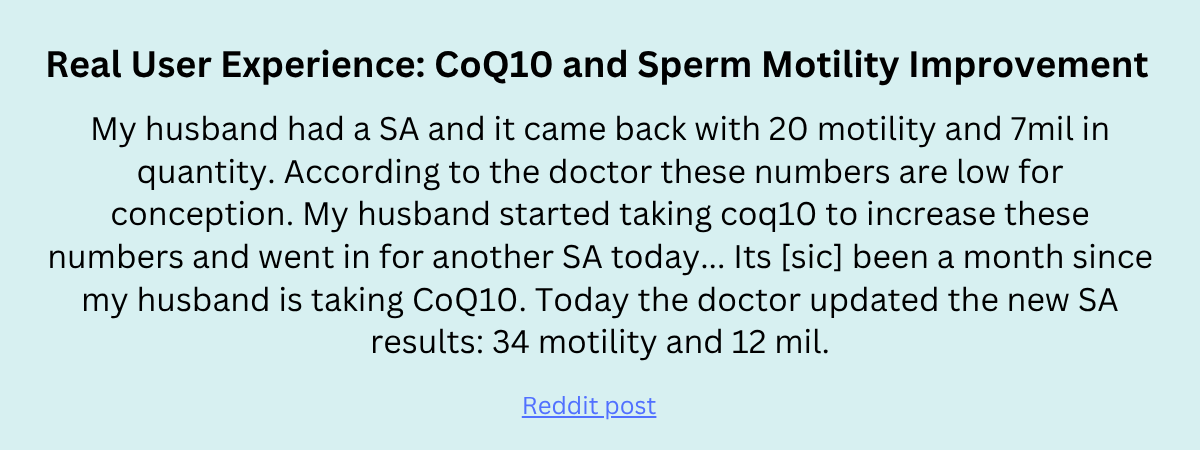Explore All Articles
Explore All Articles


Male subfertility affects many couples trying to achieve pregnancy – up to 15% of them. Many factors are involved but one of the major contributors include the fact that, per bioethicist and researcher Dr. Vardit Ravitsky, “Over the past 40 years, sperm counts worldwide have halved and sperm quality has declined alarmingly” (emphasis added).
It takes highly active sperm to reach and fertilize the egg. When sperm are not as active as they should be (a condition known as asthenozoospermia), natural conception becomes much less likely.
Coenzyme Q10 (CoQ10) is a naturally occurring compound with antioxidant and energy production roles. It is found in every cell in your body and most of it is concentrated in the cellular power plants called mitochondria, and the cells with the greatest energy demands, like sperm cells, contain the most mitochondria.
Sperm require more energy than most other cells in the human body. They rely on mitochondria for fuel (ATP). Among the cells of the human body, sperm need energy the most. Mitochondria supply that energy (ATP) to sperm.
Sperm are very vulnerable to oxidative damage from free radicals.
What Do Experts Say? Research confirms CoQ10’s role in sperm health and fertility specialist Dr. Lora Shahine, MD explains exactly why this supplement is so effective.

A plethora of studies confirm that CoQ10 has beneficial effects on sperm quality. Here are some key takeaways from the most important of those studies:

Takeaway: For mild-to-moderate subfertility, CoQ10 is a safe, non-invasive first-line approach.
Guide to Male Fertility:
Want a more detailed CoQ10 action plan? Download our User Guide for expert tips on maximizing results.
CoQ10 is considered generally safe to use and not likely to cause problems. Side effects tend to be rare and mild. They include.
The Future of CoQ10 & Personalized Fertility Supplementation
As research into male fertility and reproductive health advances, CoQ10 supplementation may soon evolve into a more personalized treatment strategy. There haven’t been any clinical trials yet to test individualized dosing based upon either the severity of the of the infertility or on the suspected pathophysiology but hopefully they will be done in the near future.
Not everyone absorbs or metabolizes CoQ10 at the same rate. Genetic variations in mitochondrial function and antioxidant metabolism may determine:
What’s Next?
Investigators are currently looking to identify genetic markers that influence CoQ10 utilization, which could lead to tailored supplementation plans for those struggling with infertility.
Advancements in AI and reproductive health tracking might make possible:
Devices you wear and tests you take at home may soon allow you to track how well your body is responding to CoQ10 and adjust your supplementation accordingly.
Currently, there is significant variation between individuals in CoQ10 absorption and response. Creative ways to increase absorption may include:
What’s Next?
Scientists are exploring liposomal CoQ10 and micronized delivery methods to improve absorption rates and ensure faster, more reliable fertility benefits.
The Future of CoQ10 in Fertility Treatment
With genetic testing, AI-driven fertility tracking, and advanced supplement delivery systems, CoQ10 supplementation is on track to become a fully personalized fertility-enhancing strategy.
Final Thoughts
CoQ10 is a proven, natural fertility booster. By improving sperm motility, count, and morphology, it offers a powerful first step toward improving male reproductive health.
Results depend upon a number of factors including age, lifestyle, and baseline fertility health.
Consult with a reproductive specialist for personalized recommendations.
Most men see measurable sperm motility improvements by month 3, with peak benefits around 6 months. Consistency is key!
Take Charge of Your Fertility Today!
CoQ10, or coenzyme Q10, is a natural antioxidant that supports cellular energy production. It plays a vital role in sperm health by enhancing motility and protecting against oxidative stress.
CoQ10 improves sperm health within 3 to 6 months, according to clinical studies. Research shows that sperm motility, count, and overall quality gradually increase over this period.
The optimal CoQ10 dosage for male fertility is 200-400 mg per day. Some studies suggest doses up to 600 mg may be beneficial for certain individuals.*
CoQ10 is generally safe with minimal side effects. Some people may experience mild digestive discomfort, headaches, or trouble sleeping if taken too late in the day.
Individuals with conditions affecting their heart health, those on statin medications, and those seeking to enhance energy levels, improve fertility, reduce fatigue and muscle weakness, and improve mental acuity are most likely to benefit from CoQ10 supplementation.
Not everyone needs CoQ10 supplements, as its effectiveness depends on individual health factors. Those with oxidative stress, low sperm quality, or certain medical conditions may benefit most.
For a comprehensive guide on CoQ10 dosage, supplement selection, and fertility strategies, check out our CoQ10 User Guide. Also, there are many articles here in the Learning Center covering that cover other aspects of Coenzyme Q10.
*Although I am a doctor, I am not your doctor. No information on this site is to be taken as individualized advice. Always consult with a healthcare provider who knows you, your history, and your wellness goals before making any changes to your treatment regimen.
Whether you are much interested in investing, our collection of articles is designed to educate and empower you.